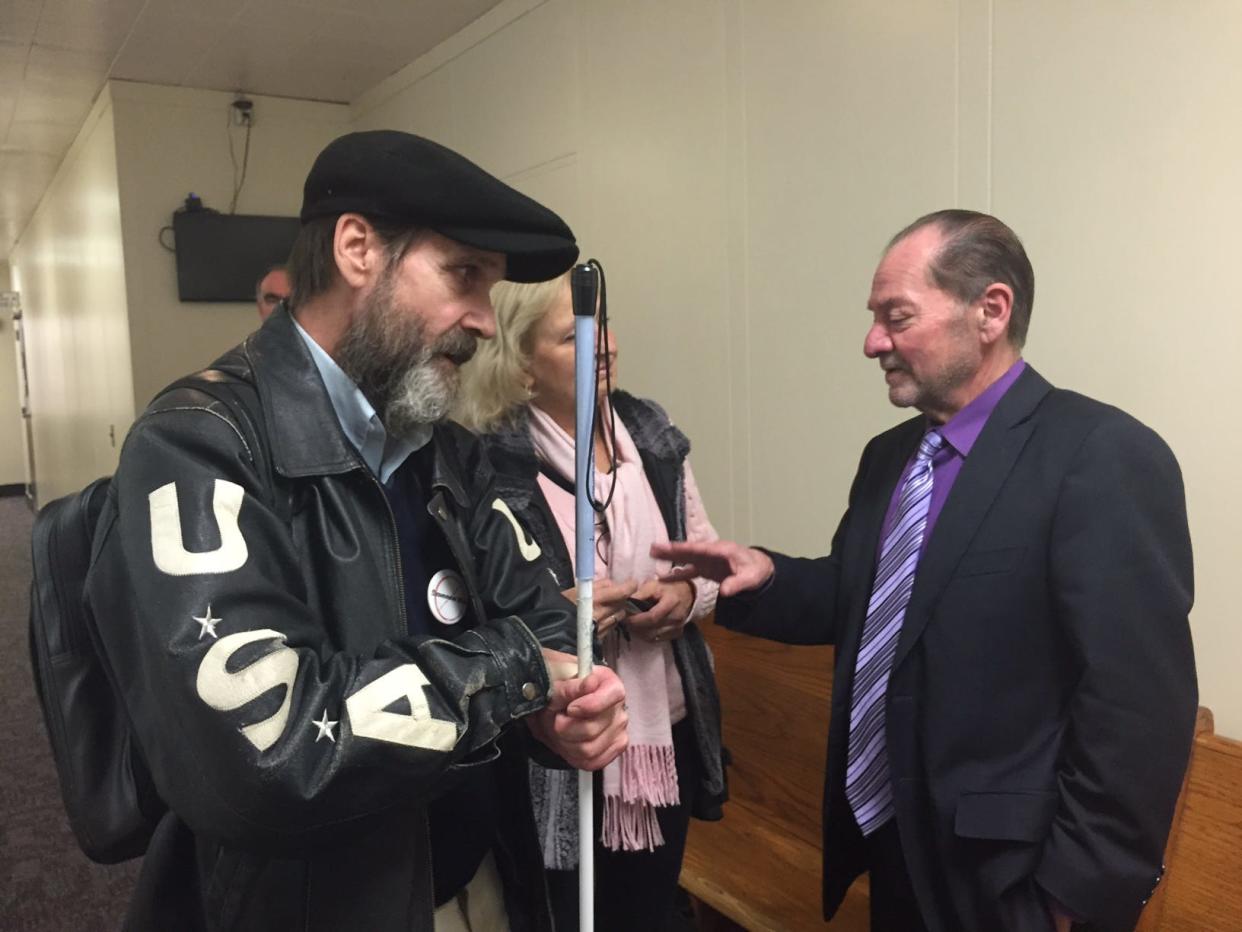MSP to pay $475K after barring disabled Michiganders at Americans with Disabilities event
LANSING — The Michigan State Police must pay $475,000 under a judgment issued in a federal lawsuit alleging troopers violated the constitutional rights of six Michiganders with disabilities at an event on the state Capitol lawn in 2015.
The event, free and open to the public, was a 25th anniversary celebration of the Americans with Disabilities Act.
Mt. Morris resident Joe Harcz, who is blind, was among several people with disabilities whose entrances were blocked by state troopers when they showed up intending to distribute leaflets and express concerns about certain disability policies and practices in Michigan. Nonprofit organizations that hosted the event tipped off police to keep Harcz and the others away, according to depositions in the case.

Harcz, who was in his 60s and using a white cane, was arrested and charged with resisting and obstructing police, a two-year felony. But authorities dropped the charge in 2016, minutes before the trial was set to begin.
Now, in the seven-year-old civil lawsuit brought by Harcz and other defendants, the Michigan State Police made an infrequently used "offer of judgment" on the eve of trial. The plaintiffs agreed and U.S. District Judge Jane Beckering issued the judgment Wednesday in federal court in Michigan's western district.
The judgment does not specify counts or findings but sets out the financial settlements and says the state waived a government immunity defense for this specific case.
"It's a complete victory for our clients," said Julie Porter, a Chicago partner in the law firm that acted for the plaintiffs. "My view is it covers all of the claims in the complaint."
But despite the judgment handed down in the case, MSP spokeswoman Shanon Banner said Friday the agency admits no liability.
"In entering into this resolution, the Michigan State Police made no admission of liability or constitutional violation in this matter," Banner said. "The MSP and the state of Michigan assert this resolution was entered into for the sole and exclusive purpose of resolving a dispute between the parties in a way to avoid the costs and productivity loss of further litigation."
In monetary settlements that don't involve judgments, a defendant's denial of liability is typically made part of the court record. An "offer of judgment" does not require an acceptance of liability, but in this case, no denial of liability was made part of the court record in connection with the judgment.
The suit sought a declaration that the MSP had violated the plaintiffs' free speech rights. It also alleged false arrest, among other counts.
Harcz said Friday it was important to him to have a judgment against the MSP, rather than a settlement in which defendants typically do not admit wrongdoing.
"They put up barriers against us on Barrier Removal Day — literally," Harcz said in reference to the day set aside to celebrate the ADA.
Eleanor Canter, who has a neurological condition requiring her to use a mobility device and was also excluded from the event, said the judgment sends a strong message that people with disabilities won't be treated as second-class citizens.
"September 17, 2015 will go down in history as the day the state of Michigan and their partners tried to strip its disabled citizenry of our constitutional rights in broad daylight at an event celebrating our community's most notable civil rights law," Canter said.
The case involved two trips to the U.S. 6th Circuit Court of Appeals. The plaintiffs prevailed both times.
Under the offer of judgment set out by the MSP, attorneys in the case will receive $300,000. Harcz will receive $50,000. Canter, Brian Dian, Mark Eagle, David Robinson and Joseph Sontag will receive $25,000 each.
One other plaintiff, Terry Eagle, was not a party to the judgment and may proceed to trial. He is no longer represented by the attorneys who handled the case, according to court records.
Contact Paul Egan: 517-372-8660 or pegan@freepress.com. Follow him on X, @paulegan4.
This article originally appeared on Detroit Free Press: MSP to pay $475K after barring disabled Michiganders from ADA event
